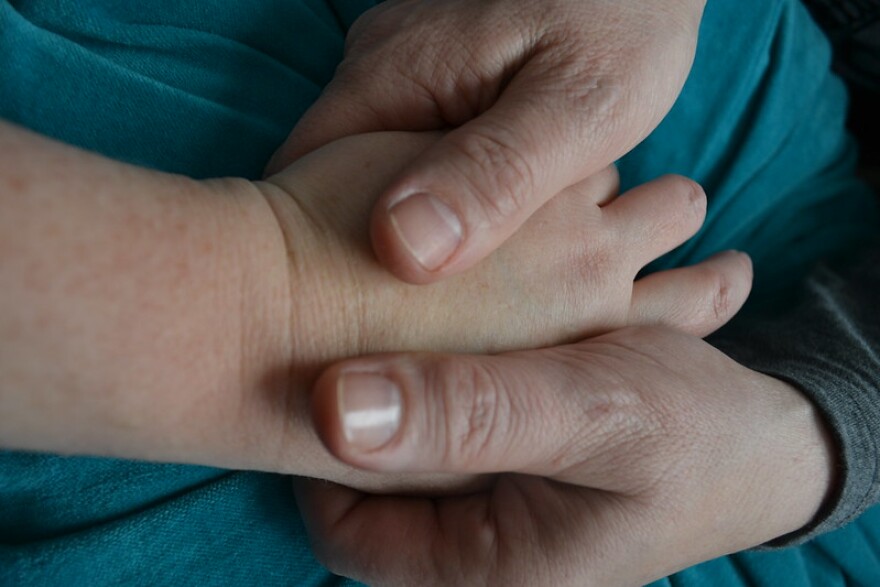Pandemic aside, giving birth is already a time of high stress and anxiety. Expecting women need all the physical, mental and emotional support they can get. But now they’re forced to make a difficult decision regarding who will accompany them in the delivery room.
Some area hospitals are restricting patients to only one support person in the delivery room and cutting off all other visitors because of COVID-19. Some hospitals across the country have restricted any and all visitors. And for women whose birth plan includes a doula, midwife, or even just a sister or mom, that can be a major complication.
The new coronavirus policies have been a major impediment to the services doulas provide. Right now, the only hospital that’s allowing a doula to accompany an expecting couple is Mercy Hospital.
On Wednesday’s St. Louis on the Air, host Sarah Fenske checked in with Sarah Baker, a certified birth educator with Purple Lotus Doulas, to discuss how doulas have had their practice disrupted due to the coronavirus. Baker detailed efforts to ensure that their presence remains in hospitals, for families that wish to have in-person care.
The conversation also included comments from expecting mothers Lawzieh Sedlmayr and Alex Yousef — and Mikayla Duncan, who gave birth to her first child in the midst of the pandemic on April 9.
Doulas are trained professionals who provide physical, emotional and informational support to a mother before, during and shortly after childbirth. They differ from midwives, who are health care professionals who can deliver babies, perform gynecological examinations, write prescriptions, care for a woman during labor and delivery and perform fetal monitoring.
"Doulas are kind of on the front lines. We are the first line of defense, oftentimes connected to people very intimately throughout their pregnancy. We're the people who are connecting them to resources, sometimes catching things that they might not be aware of that would warrant contacting their health care provider.
"And we have an impact on things like reducing the rate of [cesarean] sections, reducing requests for pain medications such as epidurals, improving breastfeeding rates — short term and long term," Baker explained.
Baker explained that the hospital limitations are forcing women to choose between their partner or doula. That’s led some expectant mothers to consider other options.
“One option that we have talked to many people about is to consider if they are a low-risk healthy pregnancy with no history of previous birth complications or things like that, to consider exploring the possibility of giving birth outside of the hospital, which would mean either giving birth at home with a midwife or giving birth in the freestanding birth center,” she said, referencing First Breath Birth & Wellness in O'Fallon, Missouri.
Baker also raised concerns about some CDC guidelines for mothers infected with COVID-19. The agency recommends that a mother diagnosed with the coronavirus be separated from her newborn for up to 14 days.
“I want to also point out that recommendation is not in alignment with what the World Health Organization has said,” Baker said. “They're saying that even if somebody is symptomatic and is currently being tested and we don't know their status as they're being waiting for those test results, that even if they do test positive, they are still recommending that newborns be able to have access to skin-to-skin with some other access to breastfeeding.
“Because we know those things are significant in terms of what is going on with a newborn the first couple of days and weeks of life,” she added. “We know that things like skin-to-skin contact is truly considered a life-saving measure. It's not just nice icing on the cake. It's not just about warm fuzzies holding your baby. This is truly a basic biological need for a newborn to have skin-to-skin contact.”
She added that a patient has the right to informed consent and can decline the recommendation to not be separated from their child.
Listen to hear the full discussion, including Baker’s explanation of how doulas teach their lessons virtually and how they’re navigating the coronavirus’ effect on their jobs:
“St. Louis on the Air” brings you the stories of St. Louis and the people who live, work and create in our region. The show is hosted by Sarah Fenske and produced by Alex Heuer, Emily Woodbury, Evie Hemphill, Lara Hamdan and Joshua Phelps. The engineer is Aaron Doerr, and production assistance is provided by Charlie McDonald.
Send questions and comments about this story to feedback@stlpublicradio.org.



